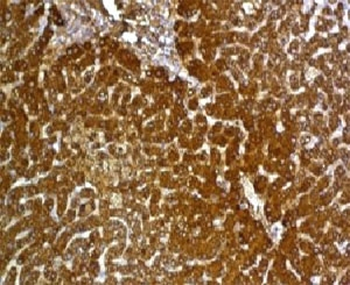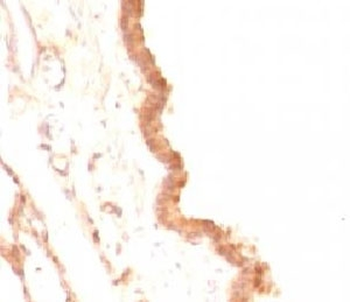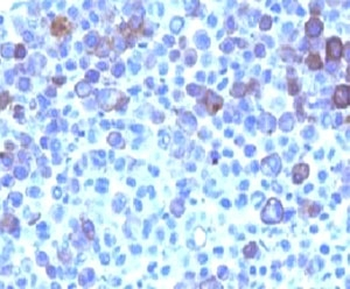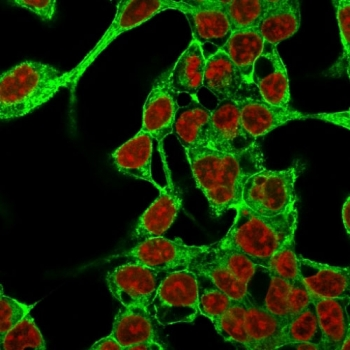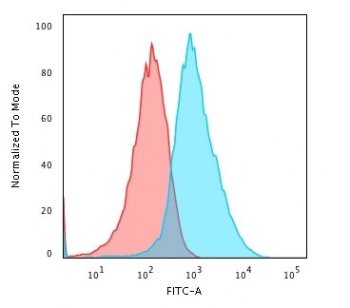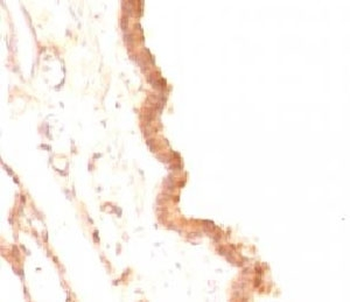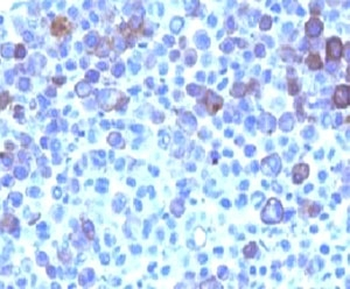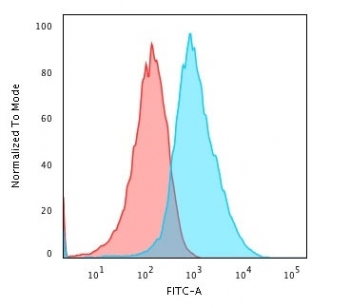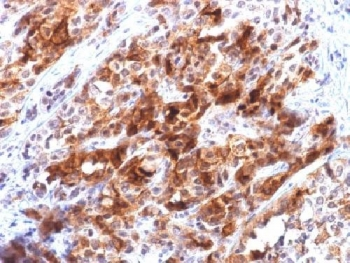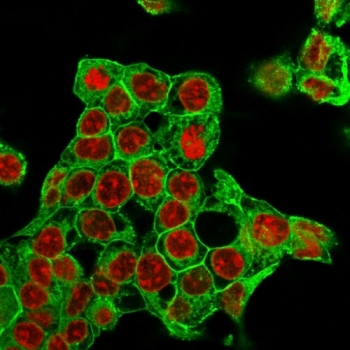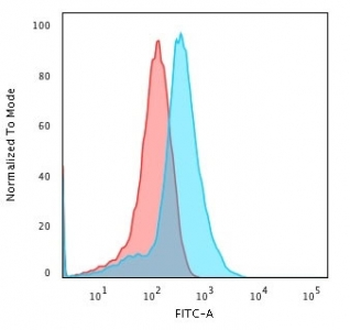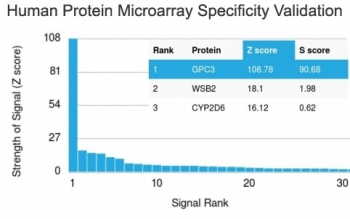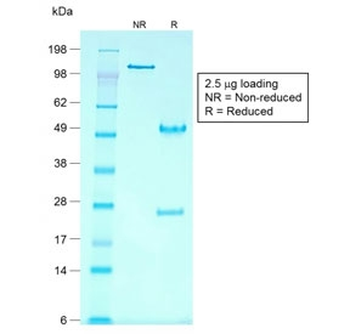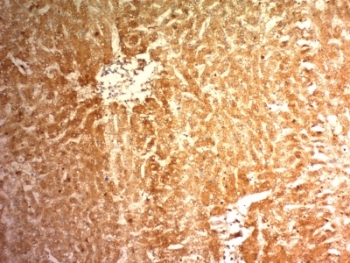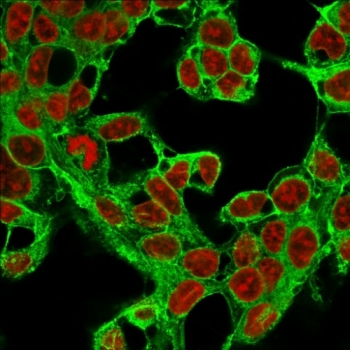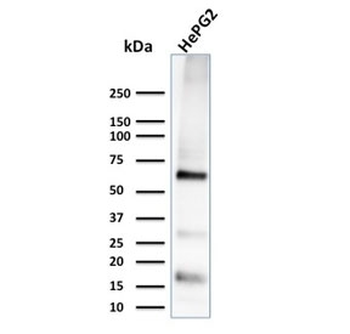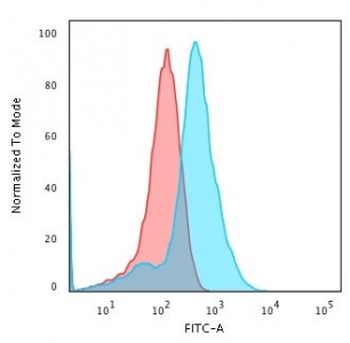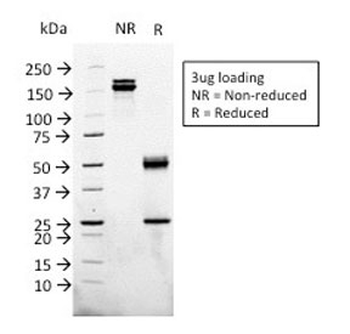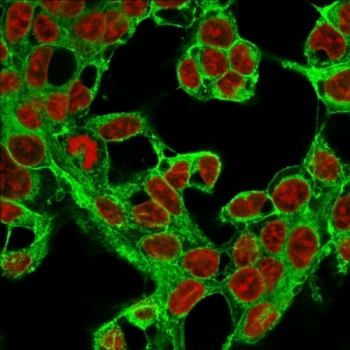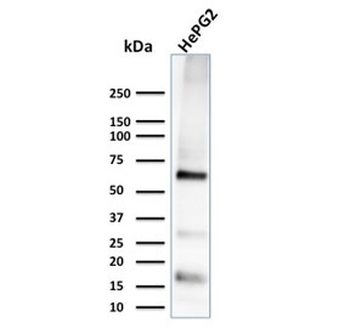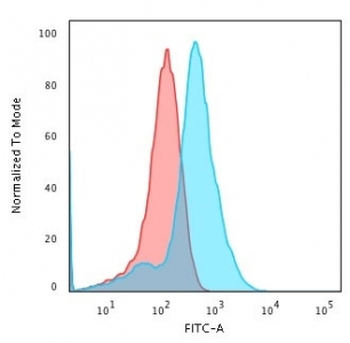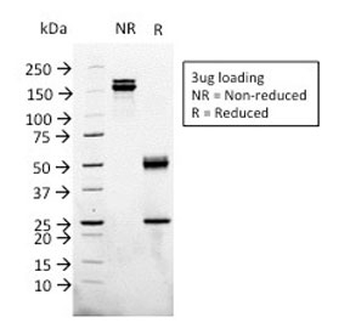You have no items in your shopping cart.
Glypican 3 Antibody / GPC3
Catalog Number: orb2640950
| Catalog Number | orb2640950 |
|---|---|
| Category | Antibodies |
| Description | Glypican-3 (GPC3) is a glycosylphospatidyl inositol-anchored membrane protein, which may also be found in a secreted form. Anti-GPC3 has been identified as a useful tumor marker for the diagnosis of hepatocellular carcinoma (HCC), hepatoblastoma, melanoma, testicular germ cell tumors, and Wilm s tumor. In patients with HCC, GPC3 is overexpressed in neoplastic liver tissue and elevated in serum, but is undetectable in normal liver, benign liver, and the serum of healthy donors. GPC3 expression is also found to be higher in HCC liver tissue than in cirrhotic liver or liver with focal lesions such as dysplastic nodules and areas of hepatic adenoma (HA) with malignant transformation. In the context of testicular germ cell tumors, GPC3 expression is up regulated in certain histologic subtypes, specifically yolk sac tumors and choriocarcinoma. A high level of GPC3 expression is also found in some types of embryonal tumors, such as Wilm s tumor and hepatoblastoma, with a low or undetectable expression in normal adjacent tissue. In patients with thyroid cancer, expression of GPC3 is dramatically enhanced in certain types of cancers: 100% in follicular carcinoma and 70% in papillary carcinoma. Expression of GPC3 in follicular carcinoma is significantly higher than that of follicular adenoma. In contrast, GPC3 is not expressed in anaplastic carcinoma. |
| Species/Host | Mouse |
| Clonality | Recombinant |
| Clone Number | rGPC3/863 |
| Tested applications | FACS, IF, IHC-P |
| Reactivity | Human |
| Isotype | Mouse IgG1, kappa |
| Immunogen | Recombinant full-length human Glypican 3 protein was used as the immunogen for the recombinant GPC3 antibody. |
| Dilution range | Flow cytometry: 1-2ug/million cells,Immunofluorescence: 1-2ug/ml,Immunohistochemistry (FFPE): 1-2ug/ml for 30 min at RT |
| Purity | Protein G affinity chromatography |
| Conjugation | Unconjugated |
| Formula | 0.2 mg/ml in 1X PBS with 0.1 mg/ml BSA (US sourced) and 0.05% sodium azide |
| Hazard Information | This recombinant GPC3 antibody is available for research use only. |
| UniProt ID | P51654 |
| Storage | Maintain refrigerated at 2-8°C for up to 2 weeks. For long term storage store at -20°C in small aliquots to prevent freeze-thaw cycles. |
| Buffer/Preservatives | 0.2 mg/ml in 1X PBS with 0.1 mg/ml rAlbumin (US sourced) and 0.05% sodium azide |
| Note | For research use only |
| Application notes | Optimal dilution of the recombinant GPC3 antibody should be determined by the researcher.1. The prediluted format is supplied in a dropper bottle and is optimized for use in IHC. After epitope retrieval step (if required), drip mAb solution onto the tissue section and incubate at RT for 30 min.2. View the non-recombinant version of this GPC3 antibody. |
| Expiration Date | 12 months from date of receipt. |

IHC testing of FFPE human hepatocellular carcinoma with recombinant GPC3 antibody (clone rGPC3/863). Required HIER: boil tissue sections in 10mM Tris with 1mM EDTA, pH9, for 10-20 min followed by cooling at RT for 20 min.
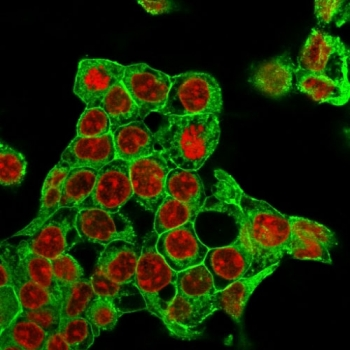
Immunofluorescent staining of methanol-fixed HepG2 cells with recombinant GPC3 antibody (green, clone rGPC3/863) and Reddot nuclear stain (red).
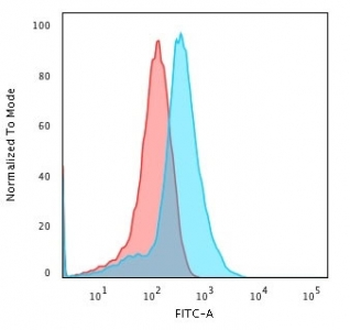
Flow cytometry testing of methanol-fixed human HepG2 cells with recombinant GPC3 antibody (clone rGPC3/863); Red = isotype control, Blue = recombinant GPC3 antibody.
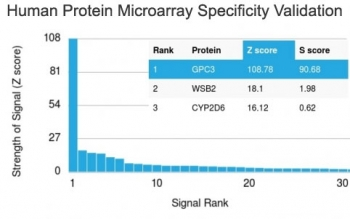
Analysis of HuProt (TM) microarray containing more than 19, 000 full-length human proteins using recombinant GPC3 antibody (clone rGPC3/863). These results demonstrate the foremost specificity of the rGPC3/863 mAb. Z- and S- score: The Z-score represents the strength of a signal that an antibody (in combination with a fluorescently-tagged anti-IgG secondary Ab) produces when binding to a particular protein on the HuProt (TM) array. Z-scores are described in units of standard deviations (SD's) above the mean value of all signals generated on that array. If the targets on the HuProt (TM) are arranged in descending order of the Z-score, the S-score is the difference (also in units of SD's) between the Z-scores. The S-score therefore represents the relative target specificity of an Ab to its intended target.
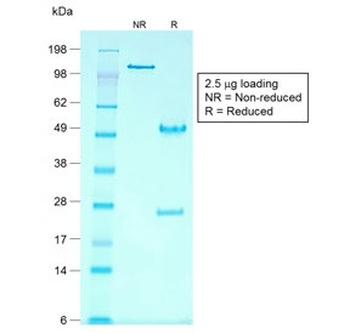
SDS-PAGE analysis of purified, BSA-free recombinant GPC3 antibody (clone rGPC3/863) as confirmation of integrity and purity.


